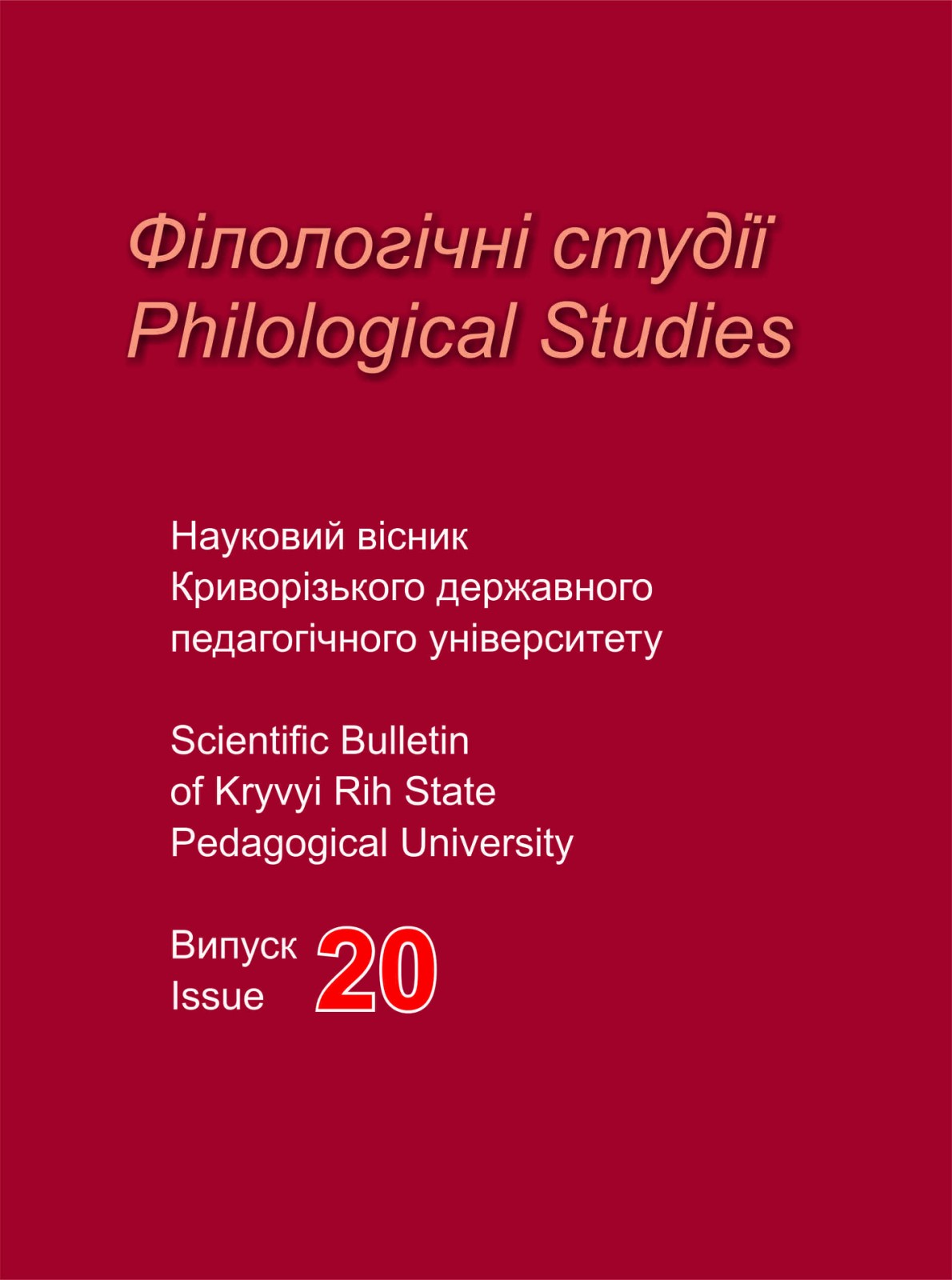Phraseological units with onomastic component as a transfer of culture (German-Ukrainian parallels)
DOI:
https://doi.org/10.31812/filstd.v20i0.3691Keywords:
phraseological units, onomasticon, anthroponym, linguoculture, background vocabulary, interlingual phraseological correlatesAbstract
The article investigates phraseological units with onomastic component in Ukrainian and German linguoculture and correlations at language unit level / a transfer of culture. Types of connotative meaning that realize these units are characterized in the article. The ways of introducing them to the structure of phraseological units (rethought biblical names; derivatives of canonized baptismal names; names related to the cultural and historical path of Ukrainian and German nations) are clarified on the example of proper names. Emphasis is made on rethinking of biblical expressions in Ukrainian and German phraseological fields, corresponding unique vocabulary. The regularities of anthroponym using in phraseological units, that has an additional positive or negative colouring (rhythm-forming function, functionality, typing) have been established. The individualized proper names, that are used to indicate a certain phenomenon or characteristics of individual human traits / general characteristics of a temper; assessment of human behavior according to the code of ethics; reproduction of the nation's worldview (cognitive, emotional levels of the world’s knowledge) that act as a typing tool are considered. The usage statistics of certain male / female names, that are used as a structural-semantic component of phraseological units in Ukrainian and German, are given. The advantage of using male names in the studied language systems is stated. Thematic groups of phraseological units with an onomastic component, which characterize or present the laws of coexistence (family, community, society) as moral imperative, reproduce folk pedagogy (education of courtesy, diligence, etc.) are separated. Further research prospects of functioning features of phraseological units with onomastic component, which consist in the development of the translation methodology of direct / figured components are outlined.
Metrics
References
Бессонова О.Л. Оценка как семантический компонент лексического значения слова : автореф. дис. ... канд. филол. наук. Донецк, 1995. 20 с.
Гаврись В.І., Пророченко О.П. Німецько-український фразеологічний словник. Deutsch-Ukrainisches phraseologisches Worterbuch. Т.1–2. Київ: Рад. шк., 1981. 416 с.; 382 с.
Кочерган М.П. Загальне мовознавство : підручник. 2 вид., випр. і доп. Київ : ВЦ “Академія”, 2006. 463с.
Лалаян Н. Генетичні типи та джерелапоходження ономастичної фразеологїї (на матеріалі німецької мови). Наукові записки Кіровоградського державного педагогічного університету імені Володимира Винниченка. Серія : Філологічні науки. 2009. Вип.81(1). С.137–141. URL: http://nbuv.gov.ua/ UJRN/Nzs_2009_81(1)_35.
Лалаян Н.С. Фразеологічні одиниці з ономастичним компонентом усучасній німецькій мові: структурно-семантичний та функціональний аспекти : дис. ... канд. філол. наук. Одеса, 2008. 180с.
Луканська Г.А., Олексієнко Л.І. Національно-культурна специфіка англійських фразеологічних одиниць з власними назвами: основні підходи до виявлення. Мова і культура. 2011. Вип.14. Т.8. С.74–81. URL: http://nbuv.gov.ua/UJRN/Mik_2011_14_8_12
МанакінВ.М. Мова і міжкультурна комунікація. Київ : ВЦ “Академія”, 2012. 288с.
Мороз О.А. Ономастична фразеологія в українській та польській мовах в національно-культурному слов’янському просторі. Наукові праці. Філологія. Мовознавство. 2016. Вип.66. Т.278. С.77–81.
ПозніхіренкоЮ.І. Мотиваційна база ергонімів як знаків соціокультурного простору України й англомовних країн (на матеріалі назв закладів харчування) : дис. ... канд. філол. наук. Київ, 2018. 264с.
Російсько-український словник паремій / Ж.В. Колоїз, З.П. Бакум, Л.А. Білоконенко, Т.І. Вавринюк, Н.М. Малюга, Н.М. Шарманова ; за ред. проф. Ж.В. Колоїз. Кривий Ріг: ФОП Маринченко С.В., 2016. 454 с.
Українські приказки, прислів’я і таке інше / упоряд. М.Номис. Київ : Либідь, 1993. 768 с.
Фразеологічний словник української мови : у 2-х кн. / уклад. : В.М.Білоноженко та ін. Київ : Наукова думка, 1993. 984с.
Чучка П.П. Слов’янські особові імена українців: історико-етимологічний словник. Ужгород : Ліра, 2011. 432 с.
Ящик Н.П. Лексико-семантична характеристика німецьких антропонімів-синонімів. Молодийвчений. Філологічнінауки. 2017. No8 (48). С.156–169.
Duden. Redewendungen und sprichwörtliche Redensarten. Mannheim, Leipzig, Zürich : Dudenverlag, 1998. 864s.
KlappenbachR. Feste Verbindungen in der deutschen Gegenwartssprache. Halle, 1971. 300s.
KüpperH. Wörterbuch der deutschen Umgangssprache. Stuttgart: Klett, 1990. 960S.
SchemannH. Deutsche Idiomatik. Wörterbuch der deutschen Redewendungen im Kontext. Berlin: De Gruyter, 2011. 1050s.
Wörter und Wendungen. Wörterbuch zum deutschen Sprachgebrauch / E.Agricola, H.Gorner, R.Kufner. Leipzig, 1972. 996s.






